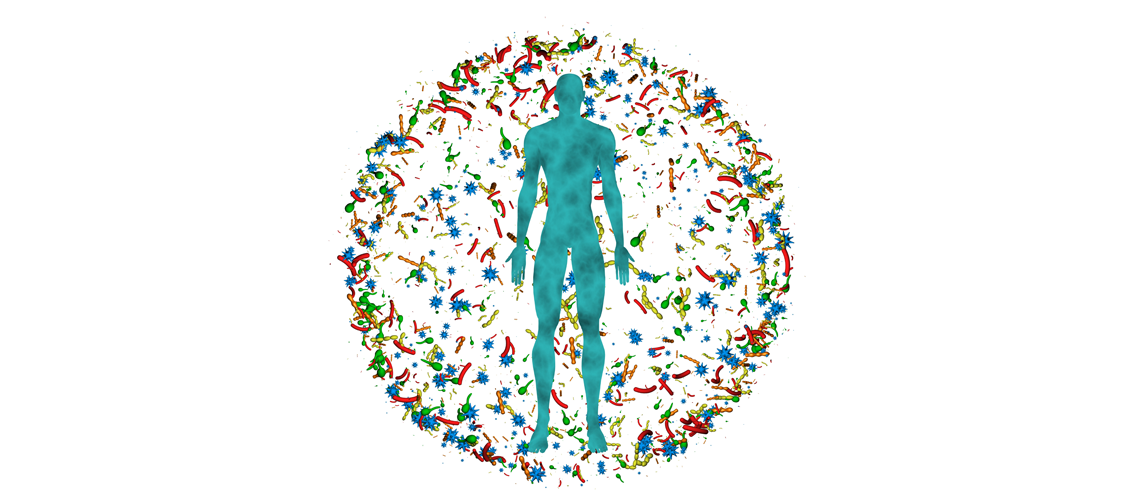The intestine, in addition to exercising its digestive actions, is the largest immune organ in our body, and this relationship may not be as well known. Since it represents the largest area of contact between the mucous membranes of our body and the environment (the small intestine is 6 meters long and the large intestine 1-1.5 meters long), it acts as the first defense barrier against the entry of pathogens, being responsible for producing up to 80% of all immune cells. According to scientific research, the intestinal microbiota (probiotics or beneficial bacteria) is also important for this defense function of our gastrointestinal tract.
In this article we want to focus more on the importance of probiotics and their relationship with the immune system, but first lets do a brief review:
Probiotics have been defined by the World Health Organization as “living microorganisms that, when administered in adequate quantities, confer a health benefit to the host”.
Lactic acid-producing bacteria isolated from the human gastrointestinal tract, plant material, or food are the most common types of microbes used as probiotics, but certain yeasts and bacilli can also be used. These bacteria are often used in fermented dairy products or in dietary supplements designed to support the efficient function of our digestive system and immune system
.
The human body is inhabited by trillions of microorganisms, spread over the different organs, which constitute what is called the human microbiome. To give us an idea, in our digestive tract alone, we have between 1-2 kg of bacteria, which are 100 trillion microorganisms or 10 times more than the number of cells in the human body. This flora can be comprised of between 300 and 1000 different species, although the majority (99%) probably come from only 30-40 species
.
The intestinal microbiota is the most studied, and it is known that its main functions are the recovery of energy and nutrients from food, protection against the invasion of pathogenic microbes and the regulation of the immune system.
As clinical studies with the administration of probiotics increase, the medical community is becoming more aware of their importance, and today few health professionals stop recommending them to improve various health conditions. Important studies are currently being carried out on its beneficial role in pregnancy, lactation and childhood, and good immune development of children and adults, among others
.
Gut microbiota and immune system
Extensive research that has been carried out in recent years on the microbiota has demonstrated that a good or bad microbiota can influence the proper function of our immune system. This intestinal microbiota is a fundamental part in maintaining the intestinal mucosa and gut-associated lymphoid tissue (known as GALT). A correct microbiota can, according to scientific studies, help to modulate immune responses (innate and adaptive) and to modulate inflammation. So much so, that probiotic supplementation has been shown to help prevent upper respiratory tract infections as well as reduce their average duration
.
The genres most used in food supplements are:

- Lactobacillus: The genus Lactobacillus belongs to a group of bacteria that produce lactic acid, so named because they convert lactose and other sugars into lactic acid. The acidic environment inhibits the growth of some harmful bacteria. These bacteria are found in many foods, such as yogurt and cheese, and are naturally present in a healthy gastrointestinal tract. Two species that have been scientifically proven to support the immune system are Lactobacillus rhamnosus GG (LGG) and Lactobacillus casei. LGG is considered to be one of the most important, most studied bacteria and with the most scientific evidence about its safety and efficacy .
- Bifidobacterium: The genus Bifidobacterium belongs to a group of bacteria that produce acetic acid and lactic acid. They are found in newborns and also play an important role in the adult population, being the most abundant genus in the intestine. Bifidobacterium lactis is one of the predominant species in the large intestine, with scientific evidence supporting the immune system.
- Streptococcus: within the genus Streptococcus, a group of bacteria consisting of gram-positive cocci belonging to the phylum Firmicutes and to the group of lactic acid bacteria, such as Streptococcus thermophilus, a safe bacterium with a long history of use, stands out. It is one of the most commercially important lactic acid bacteria because of its role in supporting the colonization of other bacteria (such as Lactobacillus and Bifidobacterium). Streptococcus thermophilus is considered to be one of the most commercially important lactic acid bacteria and, although this genus includes pathogenic species, S.thermophilus is considered a safe bacterium, with a long history of use and is on the list of strains of the EFSA (European Food Safety Authority) with a qualified presumption of safety.
Quality of probiotics
We must be clear that not all probiotics are the same. When choosing, we must choose:
- Those of human origin and with intestinal compatibility: resistant to humidity, oxygen, temperature, stomach acids and bile salts.
- Those that have a “name, surname and ID”, that is, who indicate what species and what specific strain it is. The strain is usually specified with a list of numbers and/or letters (example: Bifidobacterium lactis 32269, Lactobacillus rhamnosus GG).
- With our own clinical studies. Its a winning bet if we choose products that have specific strains of beneficial bacteria whose function is corroborated by clinical results.
Synergy with other ingredients
In food supplements, it is common to find products that have more than one ingredient, so that they can synergize their properties. With probiotics, two nutrients we can incorporate are vitamin D3 and zinc, both of which contribute to the normal functioning of the immune system
.
Paula Saiz

• Degree in Biological Sciences from the Complutense University of Madrid, specializing in plant biology.
• Master in Applied Plant Biology from the Complutense University of Madrid.
• Collaboration in the Endothelial Pathology Unit of the Ramón y Cajal Hospital in Madrid: clinical trials and anti-aging phytotherapy.
• He is currently part of the Department. 100% Natural Technical and Documentation and Training.
All rights reserved ©. The reproduction, partial or total, of the content in any form is prohibited without the prior written consent of Cien Por Cien Natural SL. If you want to share the information, reproduction is allowed by citing Cien Por Cien Natural SL or using the link on their website. Cien Por Cien Natural SL is not responsible for misuse of the content of the article
.






